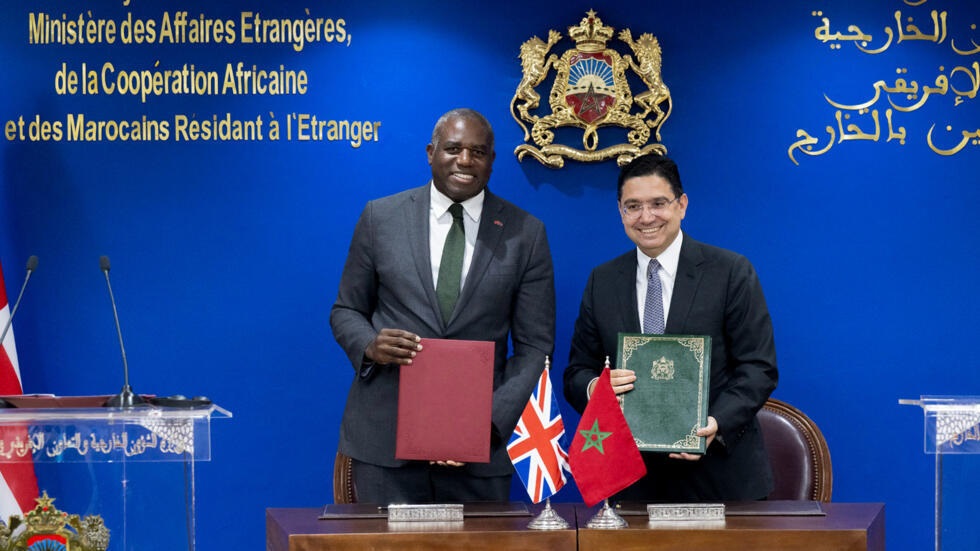The United Kingdom on Sunday, June 1, 2025, officially endorsed Morocco’s proposal for autonomy in Western Sahara, signaling a significant shift in its stance on a decades-long territorial conflict in northwest Africa.
British Foreign Secretary David Lammy made this public, during a visit to the Moroccan capital Rabat on Sunday.
He declared that the UK now views Morocco’s 2007 autonomy plan as “the most credible, viable and pragmatic basis” for settling the dispute over the region.
This endorsement marks a departure from London’s previous neutral position.
It emphasized the importance of self-determination for the people of Western Sahara without expressing a preference for any specific political outcome.
Western Sahara, a sparsely populated region home to approximately 600,000 people, has been at the center of an unresolved sovereignty dispute since 1975.
The territory is listed by the United Nations as a non-self-governing region.
Although Morocco currently controls the majority of the territory, the Algeria-backed Polisario Front controls the eastern part.
Also, it has long pushed for full independence from Moroccan rule.
Morocco’s autonomy proposal envisions Western Sahara remaining under Moroccan sovereignty while being granted limited self-governance.
This framework, put forward in 2007, has gained growing international support in recent years.
The United States was the first major power to recognize Morocco’s sovereignty over the region in 2020, under the first time in office of President Donald Trump.
Spain followed suit in 2021, and France offered its support in 2023.
Lammy emphasized that the UK would align its bilateral, regional, and international efforts with this new position, indicating a broader shift in British foreign policy towards greater support for Morocco.
“The UK will continue to act bilaterally, including economically, regionally and internationally in line with this position to support the resolution of the conflict,” he said.
His comments follows discussions with Moroccan Foreign Minister Nasser Bourita.
The UK’s policy adjustment comes amid growing international frustration over the long-standing deadlock.
After Spain’s withdrawal from Western Sahara in 1975, fighting broke out between Morocco and the Polisario Front.
A ceasefire brokered by the United Nations was signed in 1991.
It had the promise of a referendum allowing the people of Western Sahara to determine their political future.
However, that referendum has never taken place, and political negotiations have repeatedly stalled.
In 2020, the Polisario Front declared the 1991 ceasefire to be over, accusing Morocco of violating its terms.
Since then, tensions in the region have escalated, with Algeria, an outspoken supporter of the Polisario Front, repeatedly criticizing Morocco’s plan and international support for it, including from the U.S.
During Sunday’s joint press briefing, Minister Bourita welcomed the UK’s endorsement, describing it as part of “a momentum to speed up the solution of the conflict.”
He also revealed that discussions are underway regarding increased British investment in Western Sahara.
This signalled closer economic ties as a result of the political alignment.
The two nations also signed several bilateral cooperation agreements.
The agreemensts cut across sectors including healthcare, innovation, port development, water infrastructure, and government procurement.
These deals are expected to deepen the economic relationship between the UK and Morocco, particularly in areas that could benefit from development in Western Sahara.
Lammy further highlighted Morocco’s role as a key partner in preparations for the 2030 FIFA World Cup.
Morocco is billed to co-host the tournament with Spain and Portugal.
“These partnerships will allow British businesses to score big on football’s biggest stage,” Lammy said, referencing opportunities for UK firms in the lead-up to the global event.
Despite growing international support for Morocco’s autonomy plan, the United Nations has not altered its official position.
The UN continues to advocate for a negotiated settlement that allows the people of Western Sahara the right to decide their future, whether through independence or integration with Morocco.
The UK’s endorsement of Morocco’s plan does not completely close the door on other solutions.
However, it clearly signals a new diplomatic alignment with Rabat and strengthens Morocco’s hand in seeking broader recognition for its position.







